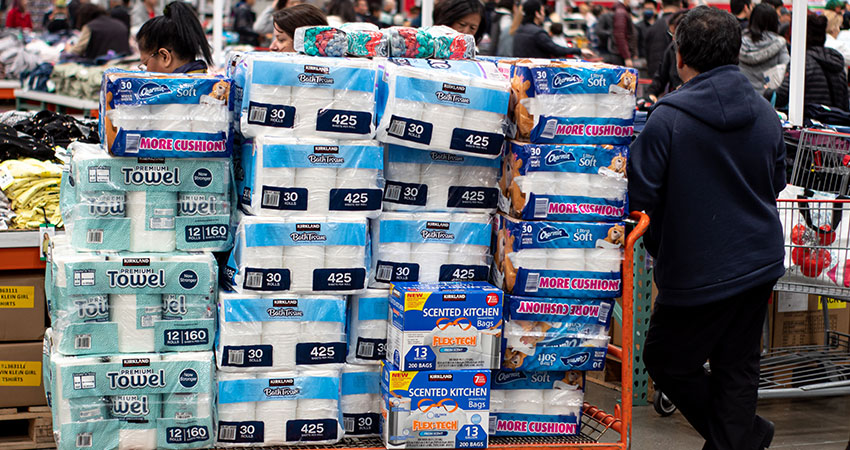A man in dire need of paper goods prepares to check out at a Costco in San Francisco (photo credit: Shutterstock)
A new consumer survey from Coresight Research highlighted a number of concerns related to the worsening coronavirus outbreak, with job losses already being reported and fear of lost income gripping one-third of respondents.
Nearly four-fifths of respondents said they were somewhat or extremely concerned about coronavirus, Coresight reported, while 4.2% said they had already lost their jobs as a result, and another 12.7% worried they could be next.
Asked to give more detail about their concerns, the number-one choice of consumers was fear of friends or relatives getting sick, cited by 60% of respondents, followed by fear of economic disruption (48%), shortage of food and other products (47%), getting sick themselves (46%), loss of income or employment (37%), having to stay home (19%), and disruption to travel (14%).
It’s interesting, and perhaps encouraging, that people listed fear of others they care about getting sick ahead of fear of themselves catching the deadly virus.
[Related: Retail and Mall Groups Ask Trump, Congress for Coronavirus Relief]
Less than 7% of respondents said they believed severe impacts from coronavirus will last less than a month, with most thinking it will last one to four months, while over one in five think there will be a severe disruption lasting five months or more.
Movie theaters (cited by 67% of respondents), restaurants, bars and coffee shops (64%) and malls (64%) were listed most often as locations that consumers are avoiding during the coronavirus outbreak. This was followed by gyms and sports centers (56%), sporting events (56%) and schools/colleges (53%)
Over half of consumers surveyed (52%) reported buying more of some categories in response to the coronavirus outbreak, while 29% said they were buying less of some categories. Two-thirds of consumers said they expect to make more purchases online if the outbreak continues, and nearly half (47.4%) said they expected changed behaviors to remain in place after the outbreak ends, such as more hygienic practices and a focus on health and wellness.
Unsurprisingly, nondiscretionary spending on food, household products, personal care and health products saw the biggest jump, with more than a third of respondents reported buying more. The biggest losers in terms of product categories were apparel, furnishings and home-improvement, electronics and appliances and beauty products.
Coresight’s results were based on a survey of 1,152 online users in the U.S. aged 18 or older on March 17 and 18, 2020.
MCM Musings: people everywhere are talking about establishment of some kind of “new normal” once the coronavirus outbreak is brought under control, and this survey seems to bear out that thinking. This global event is a massive wakeup call for retail, from how supply chains and delivery networks are structured, to over-reliance on certain trade partners, inventory management and a need to better understand the nature of consumer behavior. Coronavirus has brought into stark relief how ill-equipped we were as a country, both in the private and public sector and as individuals and families, to deal with a disruption on this scale. For one thing, the nature of work will probably never be the same. Once things settle down, we’ll see the granddaddy of all resets across the board.

